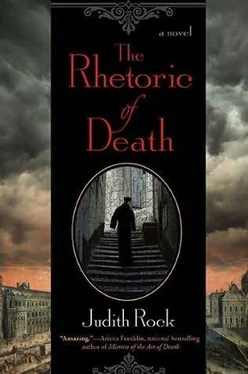Judith Rock - The Rhetoric of Death
Здесь есть возможность читать онлайн «Judith Rock - The Rhetoric of Death» весь текст электронной книги совершенно бесплатно (целиком полную версию без сокращений). В некоторых случаях можно слушать аудио, скачать через торрент в формате fb2 и присутствует краткое содержание. Жанр: Исторический детектив, на английском языке. Описание произведения, (предисловие) а так же отзывы посетителей доступны на портале библиотеки ЛибКат.
- Название:The Rhetoric of Death
- Автор:
- Жанр:
- Год:неизвестен
- ISBN:нет данных
- Рейтинг книги:3 / 5. Голосов: 1
-
Избранное:Добавить в избранное
- Отзывы:
-
Ваша оценка:
- 60
- 1
- 2
- 3
- 4
- 5
The Rhetoric of Death: краткое содержание, описание и аннотация
Предлагаем к чтению аннотацию, описание, краткое содержание или предисловие (зависит от того, что написал сам автор книги «The Rhetoric of Death»). Если вы не нашли необходимую информацию о книге — напишите в комментариях, мы постараемся отыскать её.
The Rhetoric of Death — читать онлайн бесплатно полную книгу (весь текст) целиком
Ниже представлен текст книги, разбитый по страницам. Система сохранения места последней прочитанной страницы, позволяет с удобством читать онлайн бесплатно книгу «The Rhetoric of Death», без необходимости каждый раз заново искать на чём Вы остановились. Поставьте закладку, и сможете в любой момент перейти на страницу, на которой закончили чтение.
Интервал:
Закладка:
Charles burst from his hiding place as the chamber door closed behind his quarry. He scrambled across the bed, yelling at the man to stop, and wrenched the chamber door open. But in the passage, he collided with Pere Dainville and had to stop and steady the old man while his quarry’s footsteps pounded down the main staircase. By the time Charles reached the foot of the stairs, no one was there but Frere Moulin, coming from the grand salon with a bundle of wet rags in his arms.
“Did you see him? Where did he go?” Charles demanded, nearly falling over a bucket of dirty water,
“Frere Fabre?” The lay brother nodded toward the door to the street passage where Fabre, barefoot like Moulin and with his cassock kilted, was shouldering his way out with a bucket in each hand.
“The man who just ran down the stairs! Quick, which way?”
“We’ve been cleaning, maitre, just finished.” Moulin nodded over his shoulder at the salon, whose floor gleamed wetly. “What’s wrong?”
Charles strode to the side door and into the street passage. “Did anyone come this way just now?” he called to Frere Martin, the porter, but Martin shook his head. Charles ran into the Cour d’honneur, still crowded with boys playing darts, chess, checkers, reading, and talking. He pushed his way among them, searching desperately for Antoine. The man in the boots was no casual thief, he hadn’t searched Guise’s rooms and he had known where he was going. If he was Antoine’s attacker, if he’d come to finish what he’d bungled in the rue des Poirees… Charles went weak with relief when he finally found Antoine in a shaded corner of the student residence courtyard, lying on his belly and frowning over a chessboard. His tutor lay beside him, sound asleep. Charles managed a smile for the child and prodded Maitre Doissin hard with his foot. Doissin grunted and Charles pulled him up and walked him out of Antoine’s hearing.
“I asked you to watch this child, for God’s sake!”
“Doucement, maitre, softly, sweetly! I am watching him, there he is!”
Remembering the bloody patterned necklace that strangling had left on the porter’s neck and Philippe’s, Charles said through his teeth, “Do not let him out of your sight. Do you hear me? That means keeping your damned eyes open!”
The tutor spread his arms wide in injured innocence. “He is just there. I am just here. Maitre du Luc, your humors must be out of balance-you should ask Frere Brunet to examine a specimen of your water.”
Charles turned on his heel and squatted beside Antoine. The other boy, frowning over his next move with his tongue sticking out of the corner of his mouth, paid no attention.
“Remember our talk, mon brave?” Charles said in Antoine’s ear. “Here’s something else you can help me with. Stay close to Maitre Doissin. Don’t let him nap. Don’t let him out of your sight. Even when you go to your grammar class, make sure he stays by the door.”
Antoine rolled over and sat up. “Why?” he said eagerly.
“I can’t tell you yet. Will you do it? Knights cannot always tell their squires everything, you know,” he added, as Antoine began to frown.
“That’s true. All right.” Antoine glanced tolerantly at his tutor and nodded. “I’ll look after him. He needs it.” He went back to his game.
Charles went quickly through the rest of the courtyards without finding the man in the jackboots. Trying to search the college buildings by himself was pointless and he went back to the Cour d’honneur. How had the man gone so unnoticed and disappeared so quickly? Charles’s head snapped toward the latrine court and he broke into a run.
He ran past the latrine and up the stairs to the students’ library, ignoring the bell ringing for afternoon classes. The long, silent library, its walls lined floor to ceiling with book cupboards, with more cupboards set crosswise, making aisles, seemed empty until Guise emerged from an aisle with an open book in his hand.
“What are you doing here?” he snapped. “The bell has rung.”
“A student, mon pere,” Charles murmured vaguely, and walked past him into a cross aisle.
“No student has come in here,” Guise turned his attention back to his book.
Noting the “no student” rather than “no one,” Charles walked quickly through the aisles, searching for other ways out of the single room and finding none. But Guise’s lack of concern had already told him the man was not there. As he passed Guise on his way to the door, he glanced at the librarian’s open book.
“English?” Charles said in surprise, looking at the crisp new pages.
“A new translation of our Pere Bouhours’s life of St. Ignatius,” Guise said, unbending a little. He stroked the book’s calf binding lovingly. “Just published in London,” he said, his voice warming. “Thanks to good King James and his open loyalty to the true faith.”
“Yes, an interesting situation in England just now. Well. If you’re sure no one has come in…”
“I have told you. No student has been here, they would all rather play than use their time wisely.” The momentary warmth was gone and Guise looked pointedly at the door.
Charles went slowly back to the Cour d’honneur, caught between his conscience and his own needs. In the interest of college safety-especially Antoine’s safety-Pere Le Picart had to know about the intruder. Which meant that Charles would have to confess his presence in Guise’s study and his reason for it. He found Le Picart in the chapel, where two workmen were peering at a crack in the altar’s marble. When the rector heard Charles’s steps, he looked up and frowned.
“What are you doing here, Maitre du Luc?” He hurried down the chancel steps. “Has something happened?”
Charles told him, steeling himself for the inevitable question.
“And how do you know all this, maitre?” Le Picart’s voice was dangerously quiet.
He listened to Charles’s answer with a face like thunder. “I will alert the proctors and see to Antoine. And I will see you in my office after supper. Go to your rehearsal and apologize to Pere Jouvancy for your lateness.”
“Yes, mon pere.”
Charles left the chapel with a heavy heart and the fear that he’d just made sure his first Louis le Grand show would be his last. He hoped Le Picart would be content with shipping him back to the south instead of to some foreign mission. On the other hand, Lieutenant-General La Reynie was less likely to find him in China or New France. And what La Reynie would do to him if he failed as a “fly” might well be worse than what hostile pagan natives could come up with.
Jouvancy was coaching a sword fight when Charles arrived in the classroom. He waved away Charles’s apology and Charles went to the ballet end of the room, where Maitre Beauchamps was picking up Time’s much-mended chiming clock from the floor at Walter Connor’s feet. The dancing master flung it over his shoulder to his servant, who was taken off guard for once and missed it. It crashed to the floor, and as the man stolidly picked up the black and gold pieces, Connor flashed Charles a relieved and triumphant smile. Behind Beauchamps’s back, Charles raised clasped hands over his head in a gesture of victory.
It was a long afternoon. Charles and Beauchamps coaxed and threatened the ballet cast through a decent rendering of three of the ballet’s four parts. Hercules’s suite remembered their steps, Francois de Lille danced Hercules with more spirit, and Armand Beauclaire knew his left from his right, all of which argued divine collusion between the goddess of dance, Terpsichore, and St. Genesius, patron of anyone crazy enough to be a performer.
But the demons of chaos, expelled for the moment from the ballet, ran gleefully riot in the tragedy. The Montmorency boy playing Clovis jibed once too often at the Lithuanian general’s son playing Ragnacaire for dying like a sissy. Ragnacaire’s languid patience deserted him and he told Clovis what he could do with his bad acting. Montmorency hit him. Ragnacaire defended his honor while the rest of the cast clapped and cheered. Jouvancy stunned everyone by boxing both combatants soundly on the ears-foreign to his practice and against college rules-and setting them long passages of Virgil to copy out and translate by tomorrow.
Читать дальшеИнтервал:
Закладка:
Похожие книги на «The Rhetoric of Death»
Представляем Вашему вниманию похожие книги на «The Rhetoric of Death» списком для выбора. Мы отобрали схожую по названию и смыслу литературу в надежде предоставить читателям больше вариантов отыскать новые, интересные, ещё непрочитанные произведения.
Обсуждение, отзывы о книге «The Rhetoric of Death» и просто собственные мнения читателей. Оставьте ваши комментарии, напишите, что Вы думаете о произведении, его смысле или главных героях. Укажите что конкретно понравилось, а что нет, и почему Вы так считаете.












